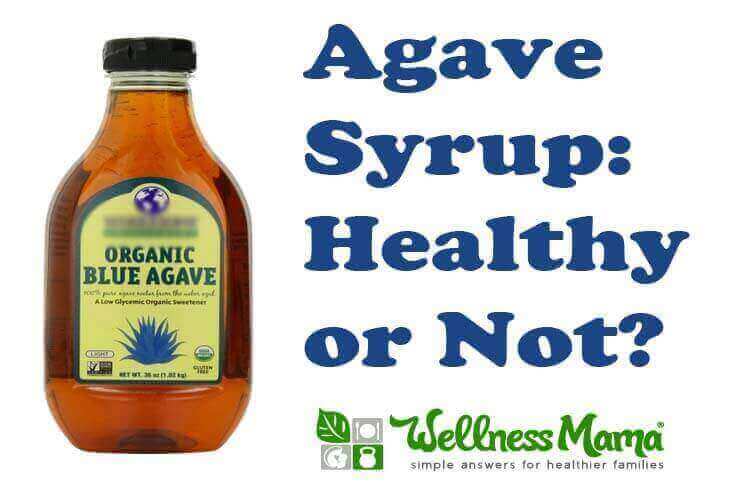I often get asked about the health of various sweeteners and sugar alternatives, and the latest one to gain popularity in recent years as a “natural” sweetener is agave. Many people use it as an alternative to high fructose corn syrup or sugar, but agave syrup is derived from the Agave plant, which is also used to make Tequila (my personal favorite use for it 😉 )
Parts of the Agave plant have been used medicinally for years, and many people are most familiar with the fermented form: Tequila. Unfortunately, Agave doesn’t live up to its new found reputation as a healthy food. I don’t personally use it and won’t consume it for several reasons:
Agave is High in Fructose
Agave originally gained popularity because it is lower in glucose than other sweeteners. While this is true, and it doesn’t raise blood sugar as much as some sweeteners, it is extremely high in fructose and in many cases, it contains a higher percentage of fructose than high fructose corn syrup. In fact, HFCS is (on average) 55% fructose while agave can be 70-97% fructose!
Fructose doesn’t affect blood sugar in the same was as glucose but it does contribute to insulin resistance and other health problems. As this article explains:
“In addition, fructose poses a danger to your cardiovascular system and could increase your risk for metabolic syndrome and heart disease. Unlike glucose, fructose can only be broken down in the liver. As it gets metabolized, uric acid and free radicals form, which can trigger inflammation and damage cells. Plus, one of the most dangerous final products of fructose metabolism is triglycerides, which can contribute to the fatty arterial plaques responsible for cardiovascular disease. High triglycerides are particularly dangerous for women, whose risk for cardiovascular disease rises three times as much for every single unit increase in triglycerides compared to men.”
Chemicals in Agave
When you read terms like “Agave Nectar” or “Agave Syrup,” you may think of a natural product that is made by simply heating the sap of a plant for a period of time (similar to how maple syrup is made). Unfortunately, this is far from the truth.
The nectar/syrup is not made from the leaves or sap of the Agave plant, but from the starchy root/bulb. Agave root is very high in inulin (mainly fructose) which is converted in to a “syrup” through a chemical process. This process involved up to a dozen chemicals, including genetically modified enzymes.
According to Bianchi, agave “nectar” and HFCS “are indeed made the same way, using a highly chemical process dependent on genetically modified enzymes”. The manufacturing process also calls for caustic acids, clarifiers, filtration chemicals and so forth in the conversion of agave starches. The result is a high level of highly refined fructose in the remaining syrup, along with some remaining inulin. (source)
Agave is often also sprayed with harsh chemicals when it is growing and some shipments sent into the US have been refused because they tested too high for pesticide levels.
Agave is also high in sapoins, which are controversial but not needed by the body and are best avoided. As this article explains:
However, the truth is that the saponins found in many varieties of agave plants are toxic steroid derivatives, capable of disrupting red blood cells and producing diarrhea and vomiting, to be avoided during pregnancy because they might cause or contribute to miscarriage by stimulating blood flow to the uterus.40 At the very least, agave products should carry a warning label indicating that the product may cause a miscarriage.
Bottom Line
Agave is high in fructose and potentially high in chemicals and sapoins. While moderate fructose consumption in its natural state (fruit) can be part of a healthy lifestyle, concentrated fructose can be harmful to the liver and over extended periods of time can cause health problems. Agave syrup as we know it today was invented in the 1990s and there is no biological reason to consume it so it is best avoided.
Do you use Agave syrup or other derivatives? Ready to switch to something healthier? Share below!


Leave a Reply